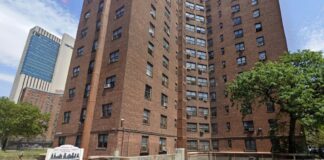An icon in the shape of an angle pointing down.
Library of Congress/Interim Archives/Getty Images
- Marjorie Merriweather Post built Mar-a-Lago as her winter home in Palm Beach, Florida, in 1927.
- Donald Trump bought Mar-a-Lago in 1985. It served as his “winter White House” during his presidency.
- The Mediterranean-style villa features 114 rooms and nearly 20 acres of grounds.
Before former President Donald Trump owned Mar-a-Lago, it belonged to the richest woman in the US.
Marjorie Merriweather Post, heiress to her father’s Post cereal fortune, built the Palm Beach, Florida, estate as her winter home. Construction began in 1924 and finished in 1927, making Mar-a-Lago almost 100 years old.
During the rest of the year, she divided her time between Hillwood Estate, a 26,000-square-foot mansion in Washington, DC, and Camp Topridge in the Adirondack Mountains in Upstate New York.
These vintage photos show what Mar-a-Lago looked like while Post lived there.
Mar-a-Lago was built by Marjorie Merriweather Post, who was known as the richest woman in the US.
George Rinhart/Corbis via Getty Images
Post inherited her father’s $20 million Postum Cereal Company upon his death in 1914. She helped expand the company into the General Foods Corporation and served on its board of directors — one of the first women in the US to hold such a role.
When she died in 1973, Post’s fortune totaled around $250 million, or around $1.8 billion today when adjusted for inflation.
Post and her then-husband E.F. Hutton hired an architect named Marion Sims Wyeth to design the 114-room Mediterranean-style villa.
Library of Congress/Interim Archives/Getty Images
According to Mar-a-Lago’s official website, Post and Hutton searched for the perfect building location for years. When they acquired what is now 1100 South Ocean Boulevard in Palm Beach, the property featured nothing more than swampland and dense thickets of brush.
Located between the Atlantic Ocean and Lake Worth, they named the nearly 20-acre estate “Mar-a-Lago,” meaning “sea to lake” in Spanish.
Post and Hutton divorced in 1935, but Mar-a-Lago remained Post’s winter escape where she hosted charity balls, dinner parties for dignitaries, and her famous square dances.
Post imported Dorian stone from Genoa, Italy, to build the home’s arches, exterior, and parts of the interior.
Library of Congress/Interim Archives/Getty Images
The stones contain small seashells and fossils, according to Mar-a-Lago’s website.
Guests entered the main house through a wrought-iron and grille-glass door that opened into an ornate entrance hall.
Library of Congress/Interim Archives/Getty Images
The hall featured sculptures carved by Austrian sculptor Franz Barwig.
Post incorporated 36,000 Old Spanish tiles throughout the home, including some that originated in the 15th century.
Library of Congress/Interim Archives/Getty Images
The carved doors in the entrance hall led into the living room.
In the living room, Venetian silk panels and carved arches added to the room’s splendor.
Jack E. Boucher/Library of Congress
The gold living room ceiling was inspired by the Thousand-Wing Ceiling at the Accademia in Venice, The Palm Beach Post reported.
The black-and-white marble floor in the dining room was sourced from a Cuban castle.
Jack E. Boucher/Library of Congress
The design of the dining room was modeled after the dining room in the Palazzo Chigi in Rome, The Palm Beach Post reported.
The dining room table, containing 11 semiprecious stones, could seat 30 people.
Jack E. Boucher/Library of Congress
The table is now on display at Post’s Hillwood Estate in Washington, DC. Unlike Mar-a-Lago, which functions at Trump’s private residence and club, Hillwood is a museum open to the public.
In the Venetian room, Post displayed pieces of Venetian glass including mirrors and a chandelier.
Jack E. Boucher/Library of Congress
Post’s Hillwood Estate also dedicated rooms to displaying her collections of art from 18th-century France and imperial Russia.
Post slept in a bedroom adorned with decorative wall panels and carved wood furniture.
Jack E. Boucher/Library of Congress
Despite its grand decor, Post only spent a few months out of every year at Mar-a-Lago.
The attached dressing room featured a fireplace and recessed sink.
Jack E. Boucher/Library of Congress
Post would use her dressing room as a space to do paperwork in the mornings.
The side of the home that faced Lake Worth was shaped like a crescent.
Library of Congress/Interim Archives/Getty Images
The facade featured two levels of cloisters.
The cloisters were furnished with plants and seating areas to take advantage of Florida’s warm weather in the winter months.
Library of Congress/Interim Archives/Getty Images
Mar-a-Lago was built to resist hurricanes with concrete and steel anchors securing it to a coral reef.
In 1961, Post commissioned Wyeth again to add a pavilion with a dance floor for her square-dancing parties.
Jack E. Boucher/Library of Congress
Post grew up in Illinois and maintained her love of the Midwestern pastime throughout her life.
Post left Mar-a-Lago to the US government to use as a presidential retreat, but it proved too costly to maintain.
Library of Congress/Interim Archives/Getty Images
After 10 years, the government transferred ownership of the property to the Post Foundation.
Post ultimately got her wish when Trump purchased Mar-a-Lago for around $10 million in 1985 and spent time there during his presidency.
Library of Congress/Interim Archives/Getty Images
Trump and his first wife, Ivana Trump, restored Mar-a-Lago to the way it looked when Post lived there. Trump also established the Mar-a-Lago Club in 1995, offering beach and pool amenities as well as event spaces for weddings and galas.
Mar-a-Lago has continued to make headlines as the site of a 2022 FBI raid regarding classified documents that federal prosecutors allege Trump illegally kept at his residence after leaving the White House. Trump was indicted by the Department of Justice and charged with 37 criminal charges including 31 alleged violations of the Espionage Act. A Trump-appointed judge dismissed the charges in July, and Trump plans to sue the Justice Department for $100 million.
The valuation of Mar-a-Lago was also a point of contention in Trump’s civil-fraud case. In February, a judge ruled that Trump committed fraud by falsely inflating the valuations of his properties, including Mar-a-Lago, to defraud banks and insurers and ordered him to pay a $355 million fine. Trump has appealed the ruling.



